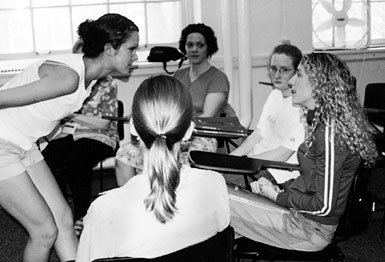A little Spanish with that stethoscope?

|
|
Language instruction by Dartmouth's Rassias Method is very intense. |
Scott Early, M.D., a 1986 graduate of DMS, learned Spanish on the job at the Greater Lawrence Family Health Center (GLFHC) in Massachusetts. But as the residency director at this busy community clinic, he didn't want his residents to have to follow that path. Learning Spanish was essential, though, as almost 90% of GLFHC's 35,000 patients are Latino.
In 1993, Early invited a local high school Spanish teacher to provide his residents with 30 hours of instruction. But the residents wanted more. Recalling the intensive Rassias Method of teaching languages from his days as an undergraduate at Dartmouth, Early contacted the Rassias Foundation. He found that its 10-day Accelerated Language Program coincided perfectly with his residents' orientation period.
The Rassias Method's immersion technique—developed to train Peace Corps volunteers in the early 1960s and adapted to college-level instruction in 1967—was perfect for busy residents. Now, a dozen GLFHC residents and faculty spend 10 days at Dartmouth every year in a basic Spanish course; it's a required part of the Lawrence family practice residency.
"Fluency is not the goal," explains Early. "Sometimes interpreters are still needed, but residents develop a great understanding of the language, and most of the visit is done in Spanish. It's been a big component of their job satisfaction. When you can't speak directly to patients, something is lost. . . . And patients really appreciate the effort."
Hispanics are the largest ethnic minority in the U.S., so for many physicians Spanish is as important a tool as a stethoscope. Sally Pruszenski, business manager for the Rassias Foundation, says DMS faculty and students often attend Spanish courses offered for the community. And the Rassias Foundation is in the process of expanding its medical Spanish program. "Many individuals are recognizing the importance of learning Spanish," says Pruszenski. "We are happy to go on the road and teach medical Spanish wherever it is needed." Bueno!
If you would like to offer any feedback about this article, we would welcome getting your comments at DartMed@Dartmouth.edu.
